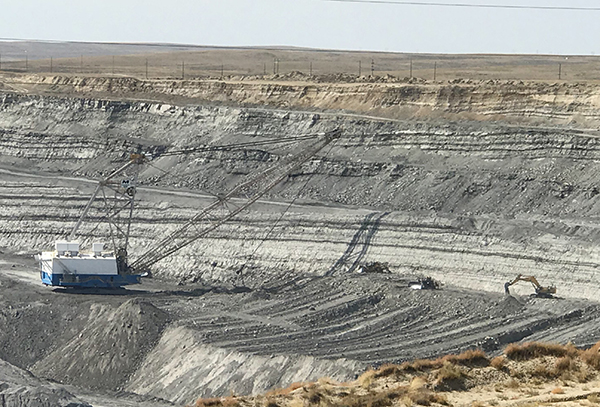Businesses Call on US Insurers to Join Global Trend of Ditching Fossil Fuels

By Taylor Kuykendall
September 18, 2020 - A coalition of businesses across the United States joined to push the country's insurance sector to stop insuring and investing in the fossil fuel sector.
A growing movement to push insurers, bankers and others in the financial sector away from coal, oil and other fossil fuels has achieved substantial success in Europe and is expanding in the United States. On Sept. 17, nearly 60 businesses called on U.S. insurers to drop their investments in fossil fuels to avoid worsening the impacts of global climate change. The list includes ice-cream maker Ben & Jerry's Homemade Inc., outdoor apparel retailers Aspen Skiing Co. LLC and Patagonia Inc., and tea manufacturer Bigelow Tea.

Cloud Peak Energy, which has since sold its assets through a bankruptcy coal auction, mines coal from the Antelope coal mine in the Powder River Basin. Insurers around the world have been rolling out policies that exclude fossil fuels, and pressure is mounting for U.S. insurers to do the same.
Photo: Alan J. Nash
"When you're trying to put out the fires, you don't invest in lighter fluid — but that's exactly what insurance companies investing in fossil fuels are doing," said Thomas Oppel, executive vice president at the American Sustainable Business Council. Oppel organized the letter with nonprofit group Green America and activist campaign Insure Our Future.
The letter marks the first time business policyholders have publicly called on U.S. insurers to break off their relationships with the fossil fuel sector, according to a related news release. The companies behind the letter said they are "deeply concerned" about the broad impacts of climate change. Implicit in the letter is the threat that the companies will begin to move away from financial services that do not take action.
"This includes a projection by the U.S. government that, unabated, global warming will shrink the U.S. economy by as much as ten percent by the end of the century," the letter stated.
Auden Schendler, senior vice president of Sustainability at Aspen Skiing, said the company has long been worried about what might happen if, for example, it loses the last two weeks of the ski season in March. The COVID-19 pandemic offered a preview of that, and the results suggest the industry would no longer be viable.
"We've been looking at the science on this for 20 years now, and the science is fairly bleak," Schendler told S&P Global Market Intelligence. Schendler said it increasingly makes good business sense for both insurers and bankers to move away from fossil fuels.
"It's actually hard to find these insurers or even banks that are less engaged in fossils," Schendler said. "I think the first play is work within and say, 'Hey, we're your customer, we want you to change.' And then the second is, there are going to be insurers and banks that evolve. They're going to become preferred because they're not involved in any activity that directly destroys our business."
Stranded Assets
The business group also pointed to the risk of stranded fossil fuel assets. The falling cost of renewable energy increasingly threatens fossil fuels' market share, particularly older coal-fired power plants. A drive for climate action will increase the likelihood that investors and stakeholders in fossil fuel projects will end up with stranded assets, according to the letter.
"In the face of hurricanes and wildfires and everything that we're seeing, certainly we see insurance companies going out of business due to this," Fran Teplitz, director of Green America's Green Business Network, said in an interview. "It's very much in their interest to align operations, with the climate reality that we face."
A recent report commissioned in the U.S. by the Commodity Futures Trading Commission's Climate-Related Market Risk Subcommittee called climate change a "major risk" to the stability of the country's financial system and the broader economy. In Europe, insurers' more rapid move away from the coal sector has been praised by Moody's Investors Service as a positive credit factor due to better positioning to "benefit from the financial opportunities presented by carbon transition."
Four large U.S. companies have policies related to excluding fossil fuels — Chubb Ltd., AXIS Capital Holdings Ltd., Hartford Financial Services and Liberty Mutual Group Inc. — but all continue to underwrite fossil fuel projects, the letter stated. An April report by a group of climate activists found that insurance companies based in Connecticut alone are investing $221 billion in fossil fuels.
"You would think that with insurance companies in particular, they would realize that by exacerbating the climate crisis, we are creating uninsurable communities," Teplitz said. "We are creating uninsurable industries. Why would we do that?"
At a Sept. 15 financial services conference, Travelers Cos. Inc. CEO Alan Schnitzer talked about company efforts regarding environmental, social and governance factors in investment. Asked about the "low-hanging fruit" of its underwriting posture on coal, Schnitzer noted that one of the products the company offers to the industry is surety bonds that encourage older mining sites' reclamation.
"It's certainly not zero, but we don't write a lot of [coal-related business]," Schnitzer said. "At the moment, the economy is, at some degree, reliant on coal, and so we can't completely abandon it."
Global Trend
Many global mining companies are moving away from coal due to pressure to act on climate change. While U.S. insurers have lagged European peers on rolling out fossil fuel exclusionary policies, the movement has been gaining ground in the U.S. In late 2019, activists said the number of insurers worldwide pledging to abandon the coal sector had doubled that year.
Coal miners have said they are struggling to find a place in a world where investors are increasingly focused on ESG concerns.
"I mean, [ESG issues have] been growing in influence over the past couple of years, and now it seems to have really caught fire," Andy Eidson, CFO and vice president of coal miner Contura Energy Inc., said Feb. 11 during a call with investors.
Willis Towers Watson, a consultancy and advisory firm focused on the insurance sector, said Sept. 16 that climate change and the pressure brought on by ESG investors will "transform the energy industry risk landscape" while many are focused on the immediate impacts of COVID-19.
"Mining companies must incorporate ESG, above all climate change, into their risk mitigation strategies in order to survive in the future," Graham Knight, head of global natural resources at Willis Towers Watson, said in the news release.

